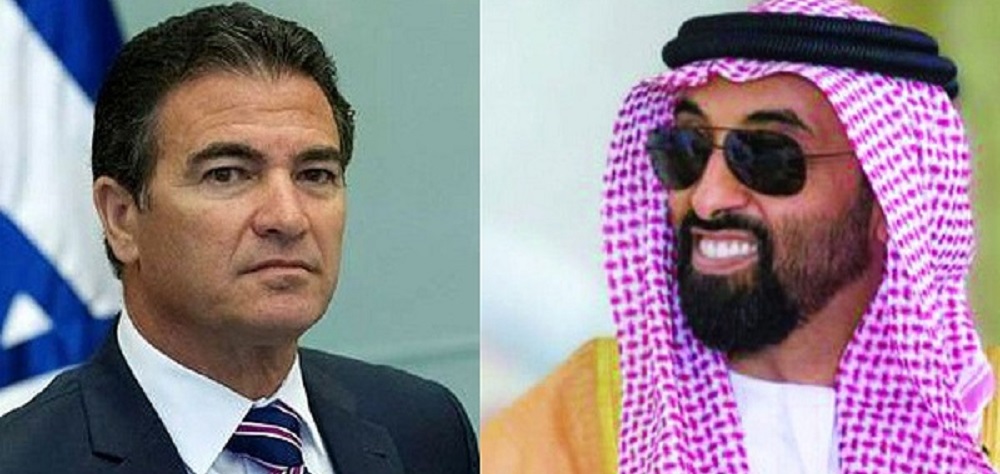Alwaght- The announcement of the Israeli-Emirati normalization of relations on August 13 and only ten days after the huge Beirut explosion dropped a bombshell that remains to dominate the headlines.
Although before the UAE two other Arab countries, Egypt and Jordan, normalized ties with the occupying Israeli regime, in the current conditions and with regard to the sensitivities associated with the “deal of the century”, the move is of great significance and demonstrates that the Emirati leaders are overtaking the Israelis towards the normalization.
Meanwhile, the visit to the UAE of the Mossad chief is an important event both in terms of the outcomes of his meetings and also the messages the visit carries to the region.
From the first cooperation deal to the Mossad chief’s visit: Goals and strategy
The process of normalization between Abu Dhabi and Tel Aviv is so hasty and influenced by an atmosphere of hysteria that the Israelis have created for the Emirati leaders. The visit of Mossad intelligence agency director Yossi Cohn to Abu Dhabi on Tuesday and talking with the UAE National Security Chief Tahnoun bin Zayed was a symbolic move aimed to exaggerate the normalization and mark it as a victory for Prime Minister Benjamin Netanyahu to push against the home criticism concerning the weakening Israeli security as a result of the Axis of Resistance role in Syria, Lebanon, and Gaza.
Only two days after the deal was publicized by the American President Donald Trump, companies from both sides announced joint work for research on a vaccine to the COVID-19 pandemic. UAE’s APEX National Investment company signed a “strategic commercial agreement” with Tera Group of Israeli regime on coronavirus research. The agreement marks the first deal to open trade, economy, and effective partnership of the UAE to the Israeli businesses.
Only five days after the statement of thaw, Cohn arrived in Abu Dhabi for talks to the Emiratis. He is among the key figures having a big role in establishing and publicizing the Abu Dhabi-Tel Aviv relations. According to reports, he several times traveled to the UAE to complete the normalization process. He holds very strong ties to the Emirati princes and rulers.
However, in addition to the symbolic aspect of the visit, there are other goals pursued by Mossad's head.
1. Israeli leaders try to take the biggest possible advantage of the current regional mayhem and the specific atmosphere that put the UAE in the course of normalization. They in fact want to put Abu Dhabi in a path of no return to pave the way for the advancement of the normalization project with other Arab states.
2. Getting security toehold in the Arab countries and boosting intelligence cooperation with them is another objective behind Cohn’s trip. In fact, the two sides over the past years engaged in security cooperation in Syria, Yemen, and other regional hot spots, most important of them the occupied Palestinian territories.
But now that the bilateral relations are open, Tel Aviv intends to build the basis for overt security and military cooperation with Abu Dhabi. Actually, the Israelis want to use the UAE as a launching pad for penetration into the Persian Gulf security equations.
3. Taking steps towards a regional coalition is another goal. As a result of the transformation of the power map in the region in the past decade and also the US policy shift towards East Asia and focus on China, unofficial coalitions have begun to emerge. One of the coalition’s consists of the UAE, Israeli regime, Saudi Arabia, and Egypt that is very conspicuously formed to rival against the Axis of Resistance alliance led by Iran and the Muslim Brotherhood-centered alliance led by Turkey. Cohen’s trip is a taboo breaker for more official visits of Israeli leaders to the Persian Gulf region and demonstrates that the two sides are quite resolved to strengthen their alliance. That the Saudi intelligence chief or a Saudi representative joined the talks in Abu Dhabi is not unlikely.
4. From another aspect, the UAE intends to play large-scale diplomatic shows as a justification of what is perceived in the Muslim world as an audacious move. To this end, UAE officials will possibly pay visits to the Israeli regime in the coming days.
Challenges and risks of normalization
Without any doubt, the UAE walking in the path of normalization with the Israeli regime is not without challenges and even risks to Abu Dhabi. In the first place, there may be an argument that the UAE as a sovereign state has the right to have diplomatic relations with Tel Aviv but this makes sense only when there are guarantees that the Israeli spy agency’s path is not opened to the country and then the whole region.
Definitely, the Israelis will seize any chance to deal blows to the Muslim countries especially the Islamic Republic of Iran and this is a red line by Tehran. In other words, any security threat and the possible establishment of an Israeli military base in the UAE will never be tolerated by Iran and thus the Emirati leaders should expect a hard response from the Axis of Resistance body. By taking such steps, the UAE turned itself into a legitimate target to the Resistance wings, as its steps are not even accepted by many Muslim countries. Now the UAE can be labeled as standing in the camp of enemies to the Palestinians and Muslims and any practical moves against the Muslim countries will draw considerable consequences.



























